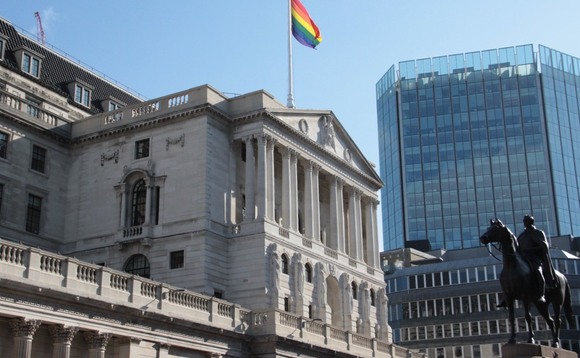
Central bank of the year: Bank of England
The Bank of England has undergone a major restructuring in recent years

The Bank of England (BoE) had a difficult 2016, marked by severe political turbulence and ongoing weakness in the European and global economies. In particular, the UK's referendum on European Union membership resulted in the central bank needing to navigate a policy and communications minefield.
Debate around the implications of the UK voting to withdraw from the EU ('Brexit') began early in 2016, and as the bank warned of the potential shock to the economy, it was accused of becoming embroiled in politics and "talking Britain down". The BoE found itself in the group of the institutions reviled as 'experts' by certain members of the Brexit camp.
Then came the shock. The UK voted to leave the EU on June 23, UK prime minister David Cameron resigned the following day, when the result was revealed, and power struggles broke out in the UK's two leading political parties. It soon became clear that the government and the civil service had no contingency plan for Brexit. Against this backdrop, the BoE executed a textbook example of crisis communications. It put out a short statement at around 7am UK time stating the BoE was "monitoring developments closely", had "undertaken extensive contingency planning", was "working closely with HM Treasury, other domestic authorities and overseas central banks", and would "take all necessary steps to meet its responsibilities for monetary and financial stability".
BoE governor Mark Carney then delivered an address to camera just before 9am, elaborating to a limited extent on some of the details provided in the statement. He highlighted the strength of UK financial institutions, saying the capital requirements of the UK's largest banks "are now 10 times higher than before the crisis" and the BoE has "stress-tested them against scenarios more severe" than the country currently faced. He added that UK banks had raised more than "£130 billion [or $175 billion using June 24 exchange rates] of capital" and had "more than £600 billion of high-quality liquid assets". Carney highlighted that the BoE could provide "more than £250 billion of additional funds" through its normal liquidity facilities and could "provide substantial liquidity in foreign currency, if required".
Amid a backdrop of sterling falling to a 30-year low against the US dollar and a $2 trillion sell-off in equities around the world, the BoE's action reassured market participants, including some of the world's largest investors in gilts, and drew praise from its former grandees. Officials at the Bank for International Settlements' annual meeting that weekend, who had expressed astonishment at the result of the vote, said early signs were that markets had functioned roughly as they ought to have done, even if the moves were violent.
 Governor Carney with his first new fiver. Image: Reuters/Stefan Wermuth
Governor Carney with his first new fiver. Image: Reuters/Stefan Wermuth
Initially, the BoE's Monetary Policy Committee (MPC) held its fire, choosing not to adjust monetary policy on July 14 by an eight-to-one vote. But in early August, the BoE acted. The MPC not only cut its policy rate to 0.25%, it also unveiled £60 billion in additional UK government bond purchases and the option to buy "up to" £10 billion in corporate bonds. It created a new £100 billion 'term funding scheme', designed to encourage banks to extend credit, and its financial policy committee amended the leverage ratio to exclude central bank reserves from the exposure measure.
The move was unusual, as it appeared the BoE was deploying monetary, liquidity and macro-prudential policies in an attempt to address political uncertainties related to the future of the UK's trading relations with the EU. With hindsight, these actions also appeared overdone. But given the lack of Brexit planning by the UK government, real concerns about UK economic growth and a pervading mood of uncertainty, officials at the BoE felt they had little choice but to act. As BoE chief economist Andrew Haldane said in late July, he would rather "run the risk of taking a sledgehammer to crack a nut" than taking "a miniature rock hammer to tunnel my way out of prison".
Institutional introspection
While the BoE's Brexit response is open to criticism, there seems to be little doubt that the central bank's aim was to act in a responsible manner. "The Old Lady has been a reassuringly calm and professional presence throughout a tumultuous 2016," says Martin Ellison, a professor of economics at the University of Oxford.
Moreover, it is the BoE's work across an array of less headline-grabbing topics that really underscores its achievement during the past year. The financial stability arm of the bank has maintained its scrutiny, tightened standards and redesigned its stress-testing framework. More planks of the UK's post-crisis capital regime have been slotted into place. Reforms have continued to financial benchmarks and the operation of key markets, while a new team has developed a framework for testing banks' cyber defences.
The BoE's overhaul of its real-time gross settlement system is also well under way, as is work on more esoteric areas of banking technology, such as distributed ledgers. The UK central bank issued the first of its new polymer banknotes – a 'fiver' bearing the image of Winston Churchill. And new communication and transparency initiatives continue to be rolled out. Ground-breaking research has continued, including the study of big data, agent-based modelling, network theory and other less-trodden areas of economics.
Laying the foundations
The manner in which business has continued as usual, despite the stormy political backdrop, highlights a deep-rooted commitment to implement best practice and plan ahead. Indeed, the process of reform at the BoE traces back many years. Four major external reviews between 2012 and 2014 – of forecasting, transparency, emergency liquidity and day-to-day liquidity – have opened the BoE up to scrutiny of a kind few central banks face.
Kevin Warsh, a former US Federal Reserve governor, was asked by Carney to conduct a review of transparency around the BoE's MPC meetings. He reported back in 2014, recommending some major changes, including the publication of transcripts of the last day of MPC meetings (with an eight-year lag) and the creation of what are now dubbed 'Super Thursdays' – the simultaneous release of policy decisions, minutes and inflation reports. The BoE adopted Warsh's recommendations in full between 2015 and 2016.
No bank has been more open-minded, more willing to take constructive input than the Bank of England. The bank is unafraid to evaluate novel reform ideas to help achieve their objectives. And they adopt these reforms with great speed and resolve
Kevin Warsh, former US Federal Reserve governor
Warsh tells CentralBanking.com that such an attitude to scrutiny and criticism is quite remarkable. "I've spent a lot of time hanging around central banks," says Warsh. "No bank has been more open-minded, more willing to take constructive input than the BoE. The bank is unafraid to evaluate novel reform ideas to help achieve their objectives. And they adopt these reforms with great speed and resolve."
David Stockton, a former head of research at the Fed, who conducted the review of forecasting in 2012, also says the BoE was open and honest during the process: "The bank really took on board the challenges I identified. That was not just the senior management, but also at the staff level. I thought their response was both positive and constructive."
Refining 'transparency'
"One subtle point often gets lost," says Warsh. "We talk about transparency as if 'more' is always and everywhere better. In my review, the bank pursued two objectives: one is transparency; but the other is getting the right answer. What the bank did is ask: 'How we can pursue both these objectives?'"
Officials at the BoE recognise this distinction – not only is it reflected in the Warsh review's balance between accountability and candid debate, but also in the bank's broad efforts to get its message across. The BoE's head of stakeholder communications is also responsible for the central bank's broader strategy – an indication of how closely the two areas knit together.
While its press office tends to err towards a more control-centric approach (taking advantage of the BoE's monopoly position) when dealing with the official media, communications more broadly at the BoE have developed in recent years. The central bank is now working to embed communications throughout the policy process, so it is considered at every stage, not just tacked on at the end. The team is focused on tailoring its message. One example is the inflation report, which is being reworked into layers – simple clear messages at the top, but additional detail and complexity for those interested in digging.
 The Bank of England flies the Pride flag on June 24, 2016, the day the UK's vote to leave the EU is revealed. Image: Dan Hinge
The Bank of England flies the Pride flag on June 24, 2016, the day the UK's vote to leave the EU is revealed. Image: Dan Hinge
The bank has also strengthened its presence on social media, although it recognises a social media strategy has to be carefully shaped to send the right message and reach the right people. The team is trialling methods such as sentiment analysis to inform its approach, as well as surveying users and running polls to gauge people's understanding and trust in the institution. Better communication with the general public and regional stakeholders is also a goal. Carney signalled this by making his first speech in Nottingham, rather than London. More recently, 'Open Forum' days attracted a much wider audience than most other BoE events and the central bank has launched its 'KnowledgeBank' website, designed to offer concise and clear explanations of its work.
Another important pillar is the bank's research, which also ties into communication. The BoE now runs an economics blog to let its economists test ideas in a less formal setting, and the renamed 'Staff Working Paper' series is meant to show that researchers are welcome to pursue ideas that might deviate from the house view. Chief economist Haldane often gives speeches in which he raises unorthodox ideas, and recently caused a stir by saying economic forecasting had gone badly awry in 2008.
Oxford University's Ellison welcomes this approach: "I don't necessarily agree with everything Andy says, but it is refreshing to see the chief economist of the BoE engage with the big issues in such an open manner."
Forecasting troubles
The BoE has strong institutional foundations, built up over many years and strengthened under both Carney and his predecessor, Mervyn King. But strong foundations can be undermined, and an example often cited is the BoE's work around Brexit, where its short-term forecasts were off course. In August, the BoE predicted a sharp slowdown of growth and a relatively smooth increase in inflation to around 2%. Inflation actually rose rapidly, and is now expected to peak at close to 3% this year. Meanwhile, the UK economy was the strongest growing of the Group of Seven in 2016, according to the International Monetary Fund. Growth even increased slightly after the Brexit vote.
Many critics, however, still treat central bank forecasts as if they are useless whenever they fail to predict the future with pinpoint accuracy. "MPC members never believed that any of the models the bank had were telling them precisely what would happen," says David Miles, who sat on the MPC from 2009 to 2015. "Although you read in the press that it all went terribly wrong and the bank has had to completely rethink how it does things, that's largely a myth."
Stockton, who used to be responsible for the US Federal Open Market Committee's forecasts, makes a similar point. Forecasts are there to help policymakers understand the "full range" of what might happen so they can position policy accordingly, Stockton tells CentralBanking.com: "You want to judge a central bank's forecast not just on its root-mean-squared error, but whether that forecast was making policymakers better aware of the risks."
They [the Bank of England] were right, in my opinion, to warn of the risks before the referendum, and their actions helped to calm down nerves once the vote had taken place
Panicos Demetriades, former governor of the Central Bank of Cyprus
Furthermore, faced with nervousness in markets, political uncertainty as a new government formed, and the threat of worse shocks to come, launching a powerful programme of easing had a significant calming effect. Some actions require 'shock and awe'.
"They were right, in my opinion, to warn of the risks before the referendum, and their actions helped to calm down nerves once the vote had taken place, although what they did in terms of the announcement carried its own risks," says Panicos Demetriades, a former governor of the Central Bank of Cyprus and professor of economics at the University of Leicester.
Allianz chief economic adviser Mohamed El-Erian raised a related idea in remarks at the UK's Houses of Parliament late in 2016: "After the outcome [of the vote], there was a real risk of a shock to the payment and settlement system... You have got to guarantee the system, and that is what the BoE did. It came out and said: 'I am here – I will basically do whatever it takes.' ... I think that was very important for confidence."
Coping with critics
Critics may be right that Carney stressed the risks more than he ought to have done during the Brexit debate. But given the political flux, calls for his resignation by some Eurosceptic politicians were overdone. And when new Conservative prime minister Theresa May signalled she was planning to effect a "change" to monetary policy, triggering speculation that the BoE's independence was under threat, Carney forcefully stood his ground. "We at the BoE have long said monetary policy has been overburdened, and that we need a better balance between monetary, fiscal and structural policy," Carney told attendees at the IMF/World Bank annual autumn meeting in Washington, DC.
Ellison says the BoE has been "quite successful" in defending its position, such that "its independence is much less under threat than in the heady days immediately after the referendum result". Ultimately, on October 31, Carney secured a one-year extension to his contract, taking it to 2019, once more defying the BoE's statutes, but effectively ending speculation about his future. Importantly, Carney's high-profile engagement enabled much of the rest of the BoE's work to continue largely uninterrupted.
There is still more work to do. The process of reform and adaptation is ongoing, with an open debate on the correct form that accountability should take, as raised in a paper last year by Harvard economists Ed Balls, James Howat and Anna Stansbury. The authors distinguish between 'operational' and 'political' independence, arguing that sacrificing some of the latter would significantly improve accountability and have little impact on policy outcomes.
Although he thinks there is unfinished business, Balls – formerly the UK shadow chancellor – praises the BoE's recent work. He tells CentralBanking.com: "The BoE, and governor Mark Carney, have done a very good job in very difficult economic and political circumstances over the past six months."
Only users who have a paid subscription or are part of a corporate subscription are able to print or copy content.
To access these options, along with all other subscription benefits, please contact info@centralbanking.com or view our subscription options here: subscriptions.centralbanking.com/subscribe
You are currently unable to print this content. Please contact info@centralbanking.com to find out more.
You are currently unable to copy this content. Please contact info@centralbanking.com to find out more.
Copyright Infopro Digital Limited. All rights reserved.
As outlined in our terms and conditions, https://www.infopro-digital.com/terms-and-conditions/subscriptions/ (point 2.4), printing is limited to a single copy.
If you would like to purchase additional rights please email info@centralbanking.com test test test
Copyright Infopro Digital Limited. All rights reserved.
You may share this content using our article tools. As outlined in our terms and conditions, https://www.infopro-digital.com/terms-and-conditions/subscriptions/ (clause 2.4), an Authorised User may only make one copy of the materials for their own personal use. You must also comply with the restrictions in clause 2.5.
If you would like to purchase additional rights please email info@centralbanking.com test test test




